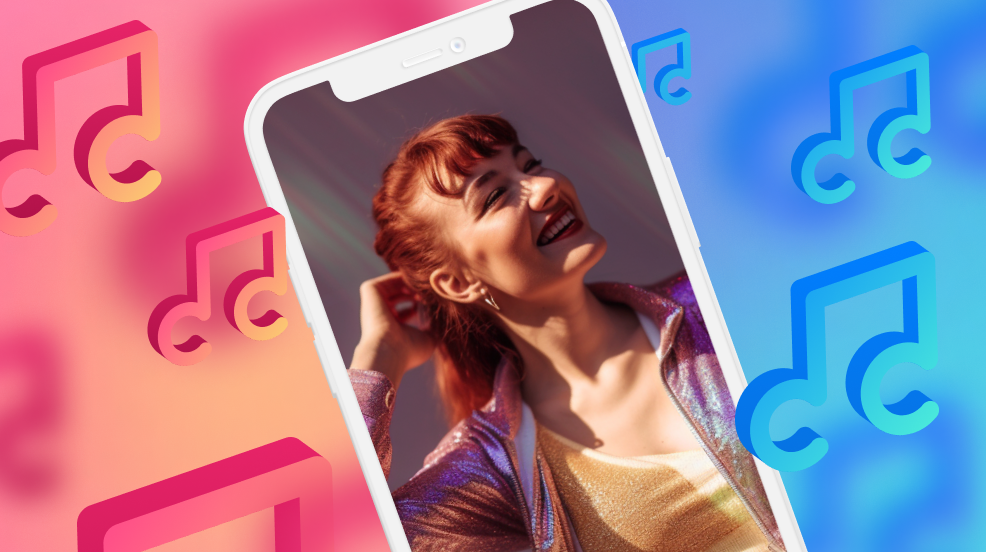Introduction
In today’s digital age, social media has become a vital platform for artists to share their music and connect with fans globally. Whether you’re an emerging artist or an established one, mastering the art of promoting your music on social media is essential to growing your fan base. This article will provide you with nine simple yet effective tips to help you promote your music successfully.
The Rise of Social Media Music Platforms
Social media has transformed the way artists share their music with the world. Platforms like TikTok, Instagram, YouTube, and even Twitter have become essential tools for musicians to reach global audiences. With these platforms, artists can bypass traditional gatekeepers like radio stations or record labels, gaining direct access to fans. As more music lovers turn to social media to discover new tracks, these platforms have become vital for any musician looking to grow their fanbase.
How to Promote Music on Social Media
Promoting music on social media requires a mix of creativity, strategy, and consistency. It’s about more than just posting songs — musicians need to engage with fans, share personal stories, and make use of popular features like Stories, hashtags, and live streams. By using visual content, running giveaways, collaborating with influencers, and responding to comments, artists can build stronger connections with their audience. Each platform has its strengths, so artists should focus on the ones where their fans are most active.
Tips to Promote Music on Social Media
1. Know Your Audience

Understanding who your audience is can make or break your social media strategy. You need to know their interests, favorite platforms, and what kind of content they prefer to engage with. Use tools like social media insights to gather data about your fans, such as age group, location, and even their preferred genre. This information will help you tailor your posts and content to better resonate with your followers.
Getting your fans involved is a fun way to boost engagement. Ask them what kind of content they want to see. This can be as simple as a poll asking which song they want you to perform next, or letting them help you choose your next single cover. When fans feel involved, they’re more likely to share and support your music. Use Instagram Stories or Twitter polls to ask questions and get instant feedback from your audience.
2. Choose the Right Platforms

Not all social media platforms are created equal, especially when it comes to music promotion. Platforms like Instagram, TikTok, and YouTube are great for sharing visuals and music, while Twitter is perfect for conversations and quick updates. Focus on the platforms where your audience spends the most time and where your content fits naturally.
It’s crucial to identify which platforms your target audience frequents the most. While Instagram and TikTok are popular for their visual and audio content, Facebook and Twitter can be useful for engaging in conversations and sharing updates. Focus on the platforms that align with your music style and audience demographics.
3. Engage Consistently with Your Fans

Social media is all about building relationships. The more you engage with your audience, the more loyal they become. Respond to comments, ask questions in your posts, and use polls or live streams to create a two-way conversation with your fans. Regular interaction keeps your audience invested in your journey and music.
Building a loyal fan base requires active engagement with your audience. Respond to comments, messages, and mentions promptly. Host Q&A sessions, polls, and live streams to interact with your fans directly. Show appreciation for their support by acknowledging their contributions and feedback. Engaged fans are more likely to support your music and share it with others.
4. Leverage Hashtags and Trends
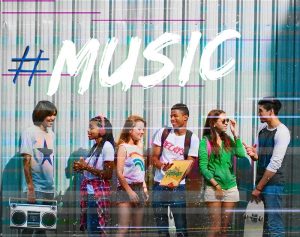
Hashtags can significantly expand the reach of your posts. Research and use popular hashtags related to your genre, and don’t hesitate to jump on trends if they align with your brand. By using hashtags effectively, you can expose your music to a broader audience who might not have discovered you otherwise.
Hashtags and keywords are powerful tools for increasing the visibility of your posts. Research popular and relevant hashtags in the music industry and incorporate them into your posts. Keywords like “Social Media Music” can help your content appear in search results, making it easier for new fans to discover your music.
5. Collaborate with Influencers and Other Musicians
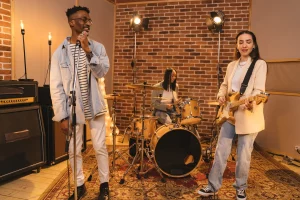
Collaborations are a fantastic way to reach new audiences. Partnering with influencers or other musicians in your genre can introduce your music to their followers. Whether it’s a social media shoutout, a joint live stream, or creating music together, collaborations can give you exposure that your personal channels might not reach.
Collaboration is a great way to expand your reach on social media. Partnering with other artists can introduce your music to their audience and vice versa. Consider collaborating on a song, hosting a joint live stream, or participating in social media challenges. These collaborations can lead to cross-promotion and increased exposure.
6. Create High-Quality Visual Content

When it comes to promoting music, visuals matter. High-quality videos, photos, and graphics grab attention and encourage engagement. Posting music videos, behind-the-scenes clips, and teaser content before a release keeps your audience excited. Remember, social media is a visual platform, and compelling visuals can help your music stand out.
Images are a key part of social media. High-quality photos or eye-catching graphics can make your profile look more professional and attractive. You can share album covers, concert posters, or photos from your performances. A well-designed post is more likely to grab attention and get shared. Use simple design tools like Canva to create professional-looking graphics even if you’re not a designer.
7. Post Regularly but Smartly

Consistency is key, but posting too often can overwhelm your audience. Create a posting schedule that keeps your fans engaged without bombarding them. A mix of promotional posts, behind-the-scenes content, and personal updates will keep your social media profile lively and engaging. Tools like Buffer or Hootsuite can help you schedule your posts efficiently.
8. Run Contests and Giveaways

Everyone loves a good giveaway! Hosting contests and giveaways can help generate buzz around your music. Encourage fans to share your posts, tag friends, or create user-generated content for a chance to win. This not only boosts engagement but also gets your music in front of new potential fans.
9. Track Your Progress and Adjust
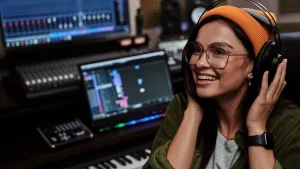
Social media marketing is not a one-size-fits-all process. Keep track of your engagement, reach, and follower growth using tools like Google Analytics, Facebook Insights, or Instagram’s in-built metrics. Use this data to identify what’s working and what isn’t, then adjust your strategy accordingly.
10. Optimize Your Profiles
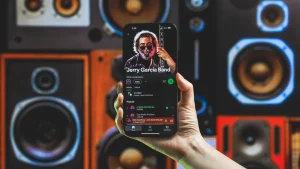
Your social media profiles serve as your digital business cards. Ensure that all your profiles are complete and consistent across platforms. Use a professional profile picture, preferably one that reflects your brand as a musician. Write a compelling bio that includes relevant keywords like “Social Media Music” to make your profiles easily discoverable. Include links to your music, whether on streaming platforms or your personal website, to guide potential fans directly to your work.
Your social media profile is often the first point of contact between you and potential fans. Make sure your profile is clear, professional, and reflective of your brand as an artist. Include a strong bio, professional photos, and links to your music on streaming platforms. Use a consistent image or logo across all platforms to help establish a recognizable brand identity.
11. Use Stories and Short Videos
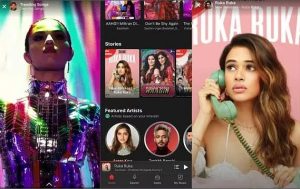
Short-form content like Instagram Stories, TikTok videos, or YouTube Shorts is a great way to share your music quickly and keep fans engaged. These platforms favor short, creative clips, so you can easily grab attention without long posts. Use stories to share daily updates, new releases, or behind-the-scenes moments. It’s a fun, easy way to stay connected with your audience and keep them interested.
Short videos are a great way to get noticed. Platforms like TikTok and Instagram Reels are perfect for sharing quick clips of your music. You can show behind-the-scenes moments, clips from your practice, or short teasers of new songs. These videos are easy to watch and share, making it a simple way to attract new listeners. Keep your videos under 60 seconds to grab attention quickly and make them shareable.
12. Leverage Paid Advertising
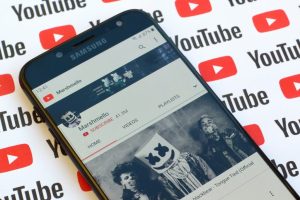
While organic reach is valuable, paid advertising can significantly boost your visibility on social media. Platforms like Facebook and Instagram offer targeted advertising options, allowing you to reach specific demographics that align with your music. Create compelling ad content that highlights your music’s unique aspects and includes a clear call-to-action, such as streaming your latest single or attending an upcoming concert.
Organic reach on social media can sometimes be limited, especially on platforms like Facebook and Instagram. Running paid ad campaigns can help you reach a targeted audience based on demographics, interests, and behavior. This is especially useful when promoting new releases, concerts, or merchandise. Set a budget for paid promotions and monitor the performance of your ads to ensure they’re reaching the right people.
Challenges of Promoting Music on Social Media
While social media offers great opportunities, it also comes with its challenges. The sheer amount of content on these platforms can make it hard for new artists to stand out. Algorithms often prioritize popular content, making it difficult for smaller musicians to reach a large audience without paid promotion. It also takes time and effort to maintain a consistent online presence, which can be challenging for artists balancing music creation and promotion.
The Future of Social Media Music Promotion
The future of music promotion on social media looks promising as platforms continue to evolve. With new tools, such as virtual concerts, augmented reality filters, and advanced analytics, artists will have even more ways to engage with fans. Social media will likely become even more interactive, offering features that allow artists to monetize their content and collaborate seamlessly with other creators. Those who can adapt to these changes and embrace the latest trends will have the best chance of growing their audience in this competitive space.
Analysis Table
| Tip | Goal | Benefit |
|---|---|---|
| Know Your Audience | Understand your fanbase | Tailored content and better engagement |
| Choose the Right Platforms | Focus on the most effective platforms | More targeted reach |
| Engage Consistently with Your Fans | Build relationships with fans | Increased loyalty and fan retention |
| Leverage Hashtags and Trends | Reach a broader audience | Exposure to new listeners |
| Collaborate with Influencers | Partner with relevant influencers/musicians | Cross-promotion and new fan acquisition |
| Create High-Quality Visual Content | Enhance the visual appeal of your music | Improved engagement and brand perception |
| Post Regularly but Smartly | Maintain a steady content stream | Keeps audience engaged without spamming |
| Run Contests and Giveaways | Boost engagement through fan interaction | Organic reach and user-generated content |
| Track Progress and Adjust | Optimize based on data | Continuous improvement in strategy |
Comparative Table: Traditional Music Promotion vs. Social Media Music Promotion
| Aspect | Traditional Music Promotion | Social Media Music Promotion |
|---|---|---|
| Reach | Limited to local/national outlets | Global reach via multiple platforms |
| Cost | Expensive (radio, TV, print ads) | Mostly free or low-cost (ads optional) |
| Engagement | One-way communication | Two-way communication with real-time feedback |
| Speed of Promotion | Slow (weeks/months for campaigns) | Instantaneous, real-time promotion |
| Content Control | Limited to third-party decisions | Full creative control by the artist |
| Analytics and Feedback | Hard to measure | Detailed analytics available instantly |
| Targeting | Broad and less specific | Precise targeting through algorithms |
Conclusion
In conclusion, promoting your music on social media requires a strategic approach that combines creativity, engagement, and analysis. By implementing these tips, you can enhance your online presence, connect with your audience, and take significant steps forward in your music career. Embrace the power of social media music promotion and watch your fanbase grow.

